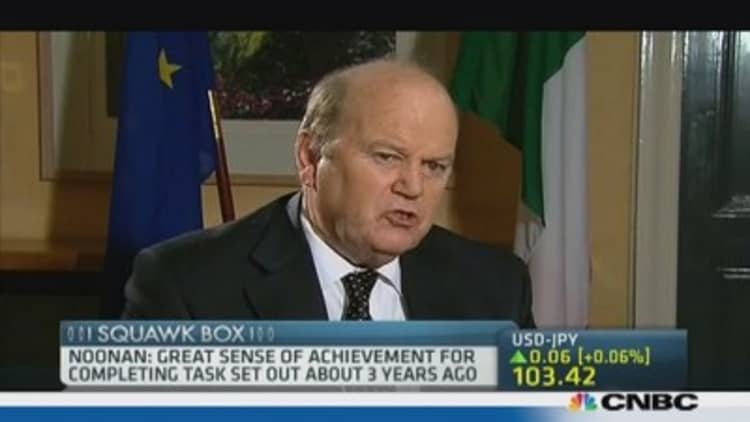
As Ireland gets ready to exit its bailout program this weekend, Finance Minister Michael Noonan tells CNBC that there is a sense of achievement that the economy is getting back on its feet.
He added that exports were likely to be the key driver of the economy going forward and expressed confidence in the government's ability to bring down high debt levels.
(Read more: Ireland exits bailout: Mission not quite accomplished)
"There's a great sense of achievement at having completed the task I set out to do almost three years ago," Noonan said in an interview late Thursday. "We had a major economic and financial crisis that needed to be addressed. We addressed it by a series of progressive measures which we implemented on a timeframe."
Ireland has relied on 85 billion euros ($114 billion) in international bailout loans and assistance from other euro zone countries, the International Monetary Fund and the European Central Bank for the past three years.
But this Sunday, the small euro zone state exits the aid program.
Dublin has put in place stiff austerity measures and overhauled the banking system. There are still areas of concern such as high government debt levels and a weak banking sector. A recently completed balance sheet assessment of Ireland's three bailed-out banks concluded that all three have not made adequate provisions for bad loans.
(Read more: Ireland risk long-term pain for short-term gain)
Data from Eurostat released in October showed that Ireland had a debt-to-GDP ratio last year of 117.4 percent, the fourth highest in the euro zone after Greece, Italy and Portugal.
Debt woes
"Our debt is going to peak at 124 percent of GDP this year but then it will go down," Noonan said. "We are at the highest point but it's entirely sustainable. We are working on a series of initiatives to bring the debt back down."
He said that there was no evidence that state banks required extra capital following a recent asset quality review.
"But we will be very cautious because we know bank credit is what we need to fuel a growing economy. Our policies are careful in approaching banking issues," Noonan added.
Asked to address criticism that foreign companies were using Ireland as a tax base, Noonan said: "That simply isn't true. Google is here, they have 3,500 people working here in Dublin."
(Read more: Ireland's latest austerity cut)
Noonan said he believed the next news on Ireland from Moody's was likely to be positive. Ireland is currently ranked as non-investment grade by Moody's ratings agency.
"In conversations with Moody's, our National Treasury Management Agency, which manages the debt, is of the view that Moody's adverse view is to do with having an adverse view on euro zone rather than particularly an adverse view of Ireland," he said.
"But I've no doubt at all that the next time we hear Moody's talking about Ireland it will be good news rather than bad news."
— By CNBC.Com's Dhara Ranasinghe; Follow her on Twitter @DharaCNBC


